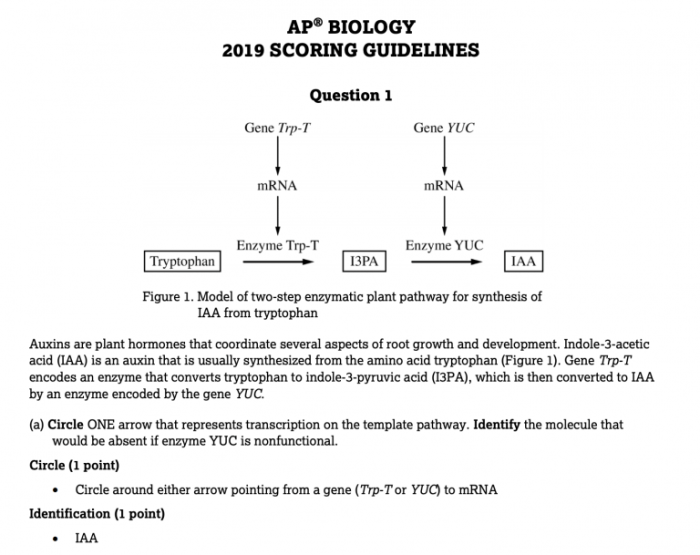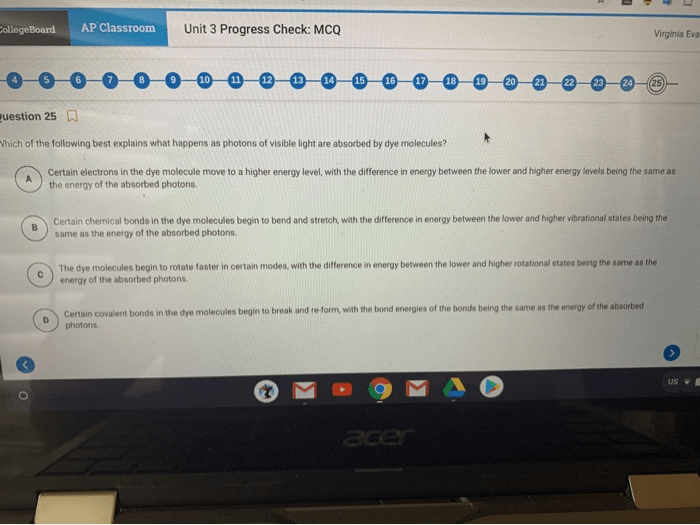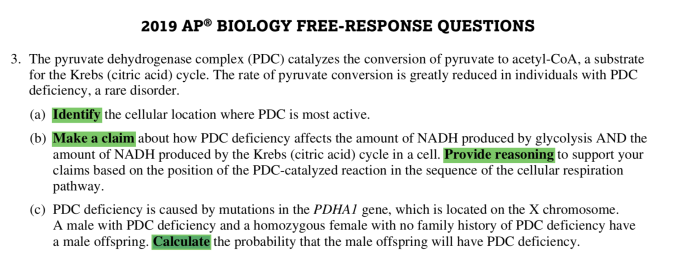Embark on a journey of academic excellence with our comprehensive exploration of the AP Biology Unit 3 Progress Check FRQ. This essential assessment gauges your understanding of core biological concepts, preparing you for success in the AP Biology exam and beyond.
Delve into the intricacies of the FRQ’s structure, question types, and grading criteria. Discover effective strategies for answering each question type and avoiding common pitfalls. Through sample questions and expert analysis, you will gain invaluable insights to maximize your score and achieve your academic goals.
Define and Explain the Key Concepts: Ap Biology Unit 3 Progress Check Frq

Definition
The AP Biology Unit 3 Progress Check Free Response Question (FRQ) is a written assessment that evaluates students’ understanding of the core concepts and principles covered in Unit 3 of the AP Biology curriculum.
Purpose and Structure
The purpose of the FRQ is to assess students’ ability to:
- Apply their knowledge of biological concepts to real-world scenarios
- Design and conduct scientific investigations
- Analyze and interpret data
- Communicate their findings effectively
The FRQ typically consists of two parts:
- A short answer question that requires students to demonstrate their understanding of a specific concept or principle.
- A long answer question that requires students to apply their knowledge to a more complex problem or scenario.
Identify and Describe the Main Topics Covered
The AP Biology Unit 3 Progress Check FRQ covers a wide range of topics within the realm of molecular biology. These topics delve into the fundamental principles of genetics and the mechanisms by which cells transmit and express genetic information.
The scope and depth of each topic vary, encompassing both foundational concepts and more advanced aspects. The topics are interconnected, building upon each other to provide a comprehensive understanding of molecular biology.
Gene Expression
Gene expression refers to the process by which genetic information encoded in DNA is utilized to direct the synthesis of proteins. This topic explores the mechanisms involved in transcription, translation, and the regulation of gene expression. Students will gain insights into the role of transcription factors, RNA polymerases, and ribosomes in the flow of genetic information from DNA to protein.
Gene Regulation
Gene regulation encompasses the mechanisms that control when, where, and to what extent genes are expressed. This topic examines the various regulatory elements, such as promoters, enhancers, and silencers, that influence gene expression. Students will explore the role of DNA methylation, histone modification, and non-coding RNAs in regulating gene activity.
Cell Communication
Cell communication is crucial for coordinating cellular activities and maintaining tissue and organ function. This topic delves into the different mechanisms by which cells communicate, including cell signaling pathways, hormone signaling, and cell-cell interactions. Students will examine the role of receptors, ligands, and second messengers in transmitting signals between cells.
Cell Cycle
The cell cycle refers to the sequence of events that occur in a cell as it grows and divides. This topic explores the different stages of the cell cycle, including mitosis and meiosis, and the checkpoints that ensure accurate cell division.
Students will gain an understanding of the mechanisms that regulate cell cycle progression and the consequences of cell cycle dysregulation.
Analyze the Format and Structure

The AP Biology Unit 3 Progress Check FRQ follows a specific format and structure, designed to assess students’ understanding of the unit’s core concepts and their ability to apply biological knowledge to real-world scenarios.
The FRQ consists of two sections, each with a distinct question format and point value distribution:
Section 1: Multiple-Choice Questions
Section 1 comprises multiple-choice questions that test students’ foundational knowledge and understanding of biological concepts. Each question is worth one point, with a total of 10 points available for this section.
Section 2: Free-Response Questions
Section 2 presents free-response questions that require students to demonstrate their ability to analyze, synthesize, and apply biological information. These questions vary in complexity and point value, ranging from 2 points to 6 points each. The total point value for this section is 20 points.
Develop Strategies for Success
Preparing for the AP Biology Unit 3 Progress Check FRQ can be daunting, but with the right strategies, you can maximize your chances of success. This guide provides tips and techniques to help you effectively prepare for and answer different types of questions.
Preparing for the FRQ, Ap biology unit 3 progress check frq
- Review the Course Content:Thoroughly review the topics covered in Unit 3, paying attention to key concepts, theories, and experimental designs.
- Practice Regularly:Engage in regular practice by solving past FRQ questions or creating your own. This will help you become familiar with the format and question types.
- Time Management:Practice answering questions within the time constraints of the exam. Develop strategies for pacing yourself and allocating time effectively.
- Understand the Scoring Rubric:Familiarize yourself with the scoring rubric to understand the criteria for earning points.
Answering Different Question Types
- Short Answer:Provide concise and specific answers that directly address the question. Support your answers with evidence or examples from the course material.
- Long Answer:Develop well-organized and coherent responses that demonstrate your understanding of the topic. Use clear and precise language, and provide specific examples to support your claims.
- Data Analysis:Analyze data presented in graphs, tables, or figures. Extract relevant information and draw valid conclusions based on the data.
- Experimental Design:Describe and evaluate experimental designs, identifying variables, controls, and potential sources of error.
Review Sample Questions and Responses

In this section, we will examine sample questions from the AP Biology Unit 3 Progress Check FRQ and analyze exemplary responses, highlighting their strengths and weaknesses.
Sample Question 1
Describe the structure and function of the plasma membrane.
Sample Response
Strengths:
- Provides a comprehensive overview of the plasma membrane’s structure, including its phospholipid bilayer, embedded proteins, and carbohydrate chains.
- Clearly explains the function of the membrane as a selectively permeable barrier, regulating the movement of molecules into and out of the cell.
Weaknesses:
- Could provide more detail on the specific roles of membrane proteins in transport and cell signaling.
- Does not mention the role of cholesterol in maintaining membrane fluidity.
Sample Question 2
Explain the process of passive and active transport across the plasma membrane.
Sample Response
Strengths:
- Distinguishes between passive and active transport based on energy requirements.
- Provides examples of passive transport mechanisms, such as diffusion and osmosis, and active transport mechanisms, such as the sodium-potassium pump.
Weaknesses:
- Could include more detail on the molecular mechanisms involved in each type of transport.
- Does not mention the role of ion channels and carrier proteins in facilitating transport.
Discuss Common Pitfalls and Misconceptions

The AP Biology Unit 3 Progress Check FRQ presents several common pitfalls and misconceptions that students should be aware of and avoid. These include:
Misconception about Data Interpretation
Misconception:Students may assume that simply restating the data provided in the question is sufficient for their response. Avoidance:Students should go beyond simply restating the data and focus on interpreting and analyzing the data to draw meaningful conclusions.
Pitfall of Incomplete Explanations
Pitfall:Students may provide incomplete explanations or fail to support their claims with evidence. Avoidance:Students should ensure their explanations are comprehensive and supported by specific evidence from the question or their own knowledge.
Misconception about Time Management
Misconception:Students may believe they have ample time to complete the FRQ and do not prioritize their time effectively. Avoidance:Students should manage their time wisely by allocating sufficient time to each question and avoiding spending too much time on any one question.
Pitfall of Unclear or Unorganized Writing
Pitfall:Students may write responses that are unclear, disorganized, or difficult to follow. Avoidance:Students should organize their responses logically, using clear and concise language, and proofread their work before submitting it.
FAQ Explained
What is the purpose of the AP Biology Unit 3 Progress Check FRQ?
The AP Biology Unit 3 Progress Check FRQ assesses students’ understanding of key biological concepts covered in Unit 3, providing valuable feedback on their progress and areas for improvement.
How should I prepare for the AP Biology Unit 3 Progress Check FRQ?
Effective preparation involves thoroughly reviewing course materials, practicing answering different question types, and seeking support from teachers or peers as needed.
What are some common pitfalls to avoid in the AP Biology Unit 3 Progress Check FRQ?
Common pitfalls include misinterpreting question requirements, failing to provide sufficient evidence to support claims, and making careless errors. Careful reading, clear organization, and thorough proofreading are crucial.